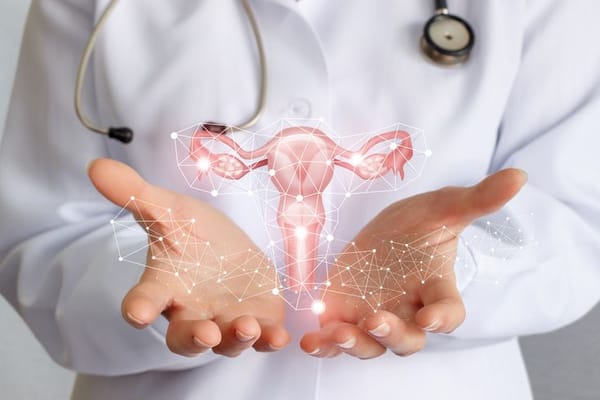- What is the Meaning of Female Fertility?
The ability to conceive a child naturally is known as fertility. Not everybody is naturally fertile. An issue with the reproductive system called infertility makes it impossible to conceive Women who have been trying to conceive for at least a year without success are typically diagnosed with infertility.
- What Causes Female Fertility Problems?
Several medical conditions can contribute to female reproductive concerns, including;
- Ovulation disorders (PCOS, Hyperprolactinemia, Thyroid problems)
- Fallopian tube damage or blockage
- Uterine or cervical abnormalities (Polyps, Fibroids)
- Endometriosis
- Early menopause
- Pelvic adhesions
- Some medical conditions (Diabetes, Cholesterol)
- Age
Apart from the medications, healthy lifestyle choices can help you boost your fertility. Here are some ideas from us to keep your fertility up.
1. Maintain a healthy weight
Women who are overweight or underweight typically have more trouble getting pregnant. A person's body may create too much estrogen when they are overweight or obese, which may interfere with ovulation. A person's body may also stop producing estrogen when they are underweight, which may also have an effect on ovulation. So, Body Mass Index (BMI) plays a significant role here.
2. Stick to a healthy diet
A healthy diet improves reproductive health and could help with ovulatory infertility, which makes up 25% of all fertility issues. You should eat foods rich in antioxidants as antioxidants like folate and zinc may improve fertility. Eating healthy fats regularly is crucial for improving fertility and general health. However, because trans fats have a deleterious impact on insulin sensitivity, they raise the
likelihood of ovulatory infertility. Lower carbohydrate diets may support menstruation regularity, help you maintain a healthy weight, lower insulin levels, and promote fat reduction. Speaking of carbohydrates, the type is just as important as the quantity. Carbs that have been refined may be particularly harmful. Sugary meals and beverages as well as processed grains, such as white pasta, bread, and rice, are examples of refined carbohydrates. These carbohydrates are absorbed relatively quickly, which raises insulin and blood sugar levels.
3. Stay Hydrated
Drinking plenty of water has many health benefits for anyone. Stay hydrated and avoiding sodas and sugary beverages may also help you conceive. Aside from improving blood flow, proper hydration ensures that sperm can easily penetrate your cervix by increasing the viscosity of your cervical mucus. On the other hand, dehydration is harmful to egg health, making it less likely that an egg will be fertilized or develop into an embryo.
4. Adequate Amount of Exercise
Exercise has a lot of health benefits. But when it comes to fertility, both excess amount or less amount of exercise can reduce the chance of conceiving. The amount of exercise that your body needs depends on your current BMI value. If you are an overweight or obese person you need more exercise to burn your excess fat layer. And if you are an underweight person, you must have weight gain exercises. So, moderation is the key factor when considering doing exercises.
5. Avoid alcohol
Alcohol has a negative impact on fertility. Heavy drinking is linked to an increased risk of ovulation problems. And consuming alcohol can increase your chances of miscarriages. So, if you want to get pregnant, you should avoid alcohol completely.
6. Don’t Smoke
Obviously, smoking is bad for health. Not only for overall health it is harmful to reproductive health also, as tobacco can prematurely age the ovaries. Smoking adds 10 years to your fertility age, making a 25-year-old have the fertility age of a 35-year-old.
7. Reduce Caffeine Intake
The link between caffeine and fertility isn't very strong. But if you are trying to conceive, caffeine consumption should be limited to 200 mg per day. Too much caffein may also increase the risk of miscarriage after pregnancy.
8. Control Your Stress Level
Mental health and fertility level are more closely linked than you might think. The additional stress can cause hormonal shifts that tell your body, the time is not right for having a baby. Cortisol, a stress hormone, then disrupts communication between the brain and the ovaries, resulting in irregular cycles. Trying to get pregnant can be stressful enough, so try to keep other stressors to a minimum. Take time each day, to relax by going for a walk, taking a long bath, or incorporating yoga or meditation into your daily routine.
9. Have Enough Sleep
Long-term sleep deprivation can disrupt your hormonal balance. Getting the recommended 7-8 hours of sleep each night can boost your levels of progesterone, estrogen, Leptin, and Follicle- Stimulating Hormones (FSH), all of which are important for achieving and carrying a pregnancy. To ensure that your personal sleep needs are met, try to get more than 6 hours of sleep but no more than 9 hours. Too much sleep can also be detrimental to fertility. Enough sleep can decrease your risk of diseases and conditions that can affect your fertility. These include diabetes, cardiovascular (heart and blood vessels) disease, and obesity.
10. Take Multivitamins
Folic acid, iron, calcium, and vitamin D supplements have been shown in studies to increase the likelihood of pregnancy. Some doctors advise taking prenatal vitamins containing vitamins A, C, and B, iodine, and zinc. Prenatal vitamins are specifically designed to meet the needs of a growing fetus. They contain higher levels of folic acid, which allows your baby's neural tube to properly fuse during
the second and third weeks of pregnancy. Because you may not even realize you're pregnant at this point, taking folic acid while trying to conceive is a good idea.
11. Take Natural Supplement
Certain natural supplements have been linked to higher fertility rates. Omega-3 fatty acid supplementation has been shown in studies to play an important role in regulating healthy ovulation. It can raise progesterone levels, which regulate the uterine lining and provide a better location for embryo attachment. Coenzyme Q10 (CoQ10) supplements may improve egg quality in women. Selenium can improve the quality of ovarian follicles significantly. As a result, the egg develops more quickly in the ovary. Selenium is an important antioxidant that helps pregnant
women avoid miscarriages and congenital disabilities. Maca (comes from a plant grown in Central Peru), bee pollen, bee propolis, and royal jelly are some examples of natural supplements that increased the rate of fertility.
12. Proper Medication
If you’re having difficulty in conceiving, make an appointment with your Obstetrics and Gynecologist to run fertility tests, determine if you need to make lifestyle changes, and prescribe treatment, if necessary.
13. Control PCOS
Polycystic Ovary Syndrome (PCOS) is a common hormonal issue among women of childbearing age. Women with PCOS may not ovulate, have elevated androgen levels, and have numerous small cysts on their ovaries. PCOS can result in irregular or missed menstrual cycles, excessive hair growth, acne, infertility, and weight gain. This condition can reduce the chance of getting pregnant. A healthy lifestyle with a healthy diet and appropriate medications can increase the chance of conceiving in women who are suffering from PCOS.
14. Monitor Ovulation
A woman who has a regular menstrual cycle ovulates 14 days before her next period. Keep in mind that women with irregular cycles will have a more difficult time tracking ovulation. It does, however, happen two weeks before the start of the next period. Keep a close eye on your ovulation cycle to improve your chances of getting pregnant. Tracking basal body temperature, breast sensitivity, and cervical mucus are a few options for detecting ovulation. Alternatively, you can buy ovulation tracking kits from your local pharmacy and test yourself mid-cycle to see if an egg is present. Also, some apps like Clue Period Tracker and Glow Cycle & Fertility Tracker can help with this regard.
15. Stay away from the Environmental Toxins
Most of us are unaware of how many chemicals we are exposed to on a daily basis. Certain occupations, such as printers, dry cleaners, industrial or agricultural workers, hair stylists, and dental assistants, may increase their chances of infertility due to chemical exposure on the job. In this case, environmental pollutants also act as toxins. Avoid toxins while trying to conceive by eating organic fruits and vegetables, reading product labels, and avoiding known pesticides can increase your chance of getting pregnant.







